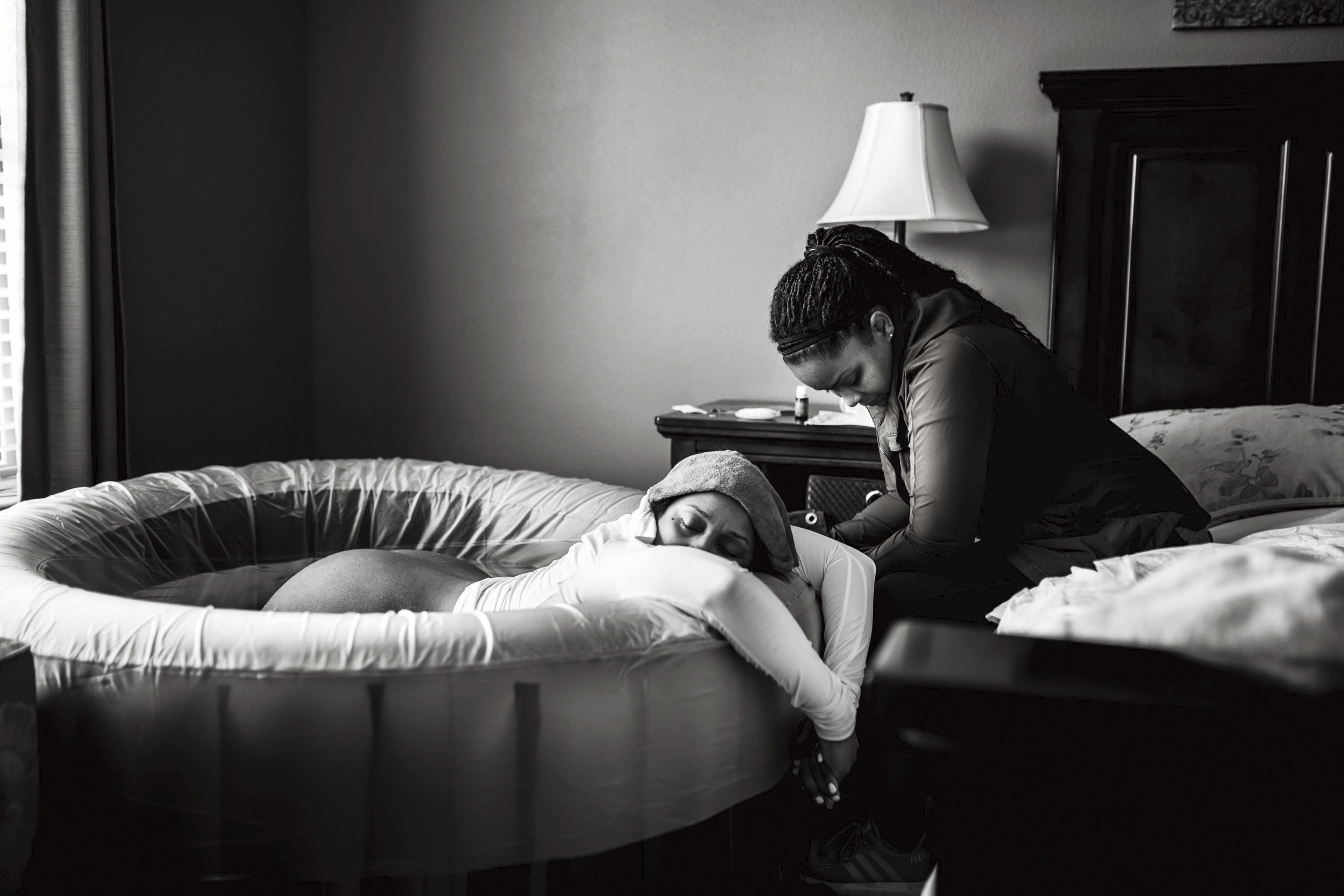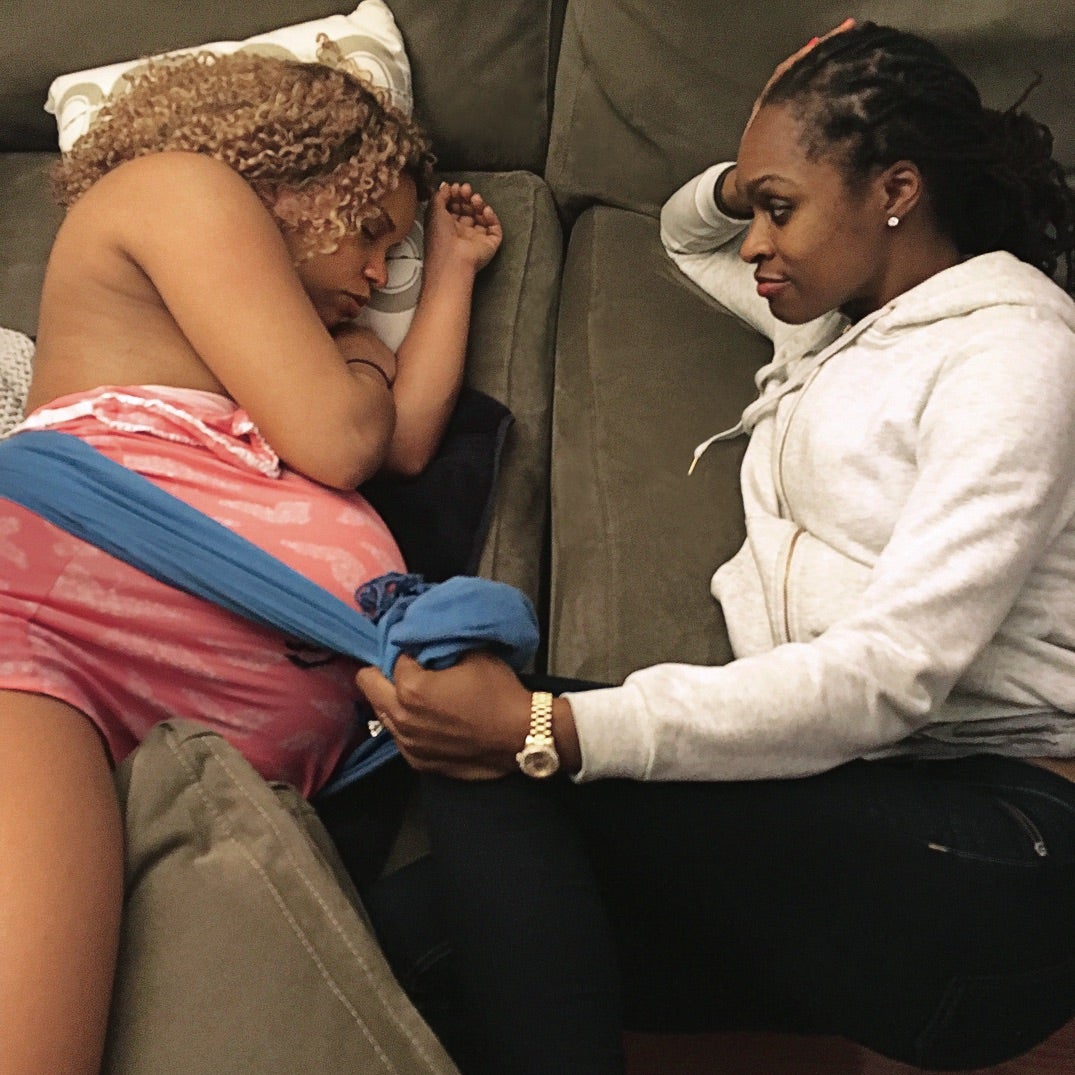This article originally appeared in the July/August 2019 issue of ESSENCE Magazine.
Hours into her labor, LeToya Luckett-Walker and her husband, Tommicus Walker, were grasping opposite ends of a towel in a full-on tug-of-war. But the costars of VH1’s T.I. and Tiny: Friends & Family Hustle weren’t in the midst of a power struggle in their hospital room. “My doula had us do this exercise where I would pull and Tommi would pull on the towel when it was time for me to push,” explains Luckett-Walker. “It helped me push the baby down.”
This type of tug-of-war is just one of many techniques that doulas—experts trained in childbirth—have in their bag of tricks to help moms before, during and after their labor. Doulas offer well-rounded coaching, giving emotional, physical and educational support to mothers-to-be. But so many of us are reluctant to get the extra assistance we might need during a fragile time despite the fact that Black women have maternal mortality rates up to four times as high as those of White women.
Even though everyone from her hairdresser to her friend Kelly Rowland had encouraged her to get a doula, Luckett-Walker resisted until her ninth month. “At first I thought it was just a trendy L.A. thing,” admits the former Destiny’s Child singer. But after moving to a new city and starting with a new doctor in her last trimester, she reconsidered. “I knew I was strong enough to do this on my own but thought I would love to be guided through this process and make it even more beautiful than it already is,” says Luckett-Walker, who praises her birth coach for helping her with everything from pain management and positioning her body during labor to being her middleman in the delivery room and helping her snap back to a healthy weight postpregnancy. In fact, Luckett-Walker says she slept through most of her nine hours in labor.
How often do you hear that?
Whether you’re on the fence about working with a birth supporter or you and your baby are already on board, it’s important to understand the many ways a doula can transform your pregnancy and delivery. Here’s the rundown.

They Provide Physical Benefits
Working with a doula has been shown to reduce the need for drugs during labor, significantly decrease a woman’s chances of having a C-section and shorten labor. And that’s just the impact on your pain and progress in the delivery room.
There are also perks as your doula works with you through your pregnancy. “There’s an onslaught of stress that hits our community, and many of us don’t have positive outlets for it,” says Latham Thomas, master birth doula to the stars (Alicia Keys) and owner of Mama Glow, a maternity lifestyle brand committed to supporting women along the childbearing path. Mama Glow offers a global doula immersion program, in New York City, Los Angeles, Paris and Miami. Latham is the only Black woman in the U.S. to do so. “We know that a laying on of hands helps to reduce stress, helps to reset your nervous system. So when a doula comes in and can massage your pressure points, guide you through breathing techniques or just listen to how your day went, that’s going to have a tangible health impact.”
Doulas can also act as an extra set of eyes and ears, says Thomas, watching for potentially life-threatening medical issues common in our community, such as hypertension and diabetes, that can create pregnancy complications. At a time when women are 50 percent more likely to die in childbirth than their mothers were decades ago, this can be critical.
They’re a Wealth of Information
“I tell my clients to look at me like Google,” says Nikki Knowles, the Dallas-based certified doula and student midwife who assisted Luckett-Walker. Knowles gets at least 20 texts a day from clients with questions about cramping, updates on doctors’ appointments, requests for chiropractor referrals and more. And if you ever find you no longer like your ob–gyn, your doula can help you locate one you connect with better.
They Break Down Your Options
Do you have to stay in bed at the hospital? Do you need to take pitocin to induce labor? Do you have to have an epidural? Or a C-section? At a time when many women feel at the mercy of their doctor, doulas help us understand our choices—and their implications. That knowledge is key.
They Produce Your Labor and Delivery
“One of my clients says that having a doula is like having a producer for your birth,” says Thomas. “So many pieces go into putting a production together that nobody realizes what’s happening behind the scenes—and we’re the ones handling that. You need somebody who’s going to know you need a sip of water after you’ve had contractions or a cold cloth on your head or a massage or the music turned off or the lights lower.” It can be as simple as setting a mood or as complicated as knowing who to talk to about what and when.

They Ease Essential Advocacy
After the birth of her daughter, Grand Slam tennis champion Serena Williams knew that something was wrong with her body and insisted on being scanned for a blood clot. The key word here is “insisted,” as nurses and doctors initially dismissed her lifesaving request. She ended up being right. “I have seen with my own eyes my Black clients get treated differently than my White clients,” says Knowles, who noted that her Black clients at the hospital are asked if they’re on government assistance while her White clients are not. Now imagine not having to deal with any of those situations because you have an advocate at your side. “The thing that I love most about my experience was the support,” says Luckett-Walker. “My doula, Nikki, was able to communicate with the doctors. She was like the middleman. She was able to lean over to me and say, ‘This is what’s about to happen. Are you okay? Do you need a moment? Is this something that you want to do?’ ”
They Give Emotional Support
Research shows that working with a doula can decrease the incidence of postpartum depression. But even if you’re not at risk for this after you give birth, doulas can provide an emotional benefit in the months leading up to delivery by easing your anxiety around a sudden cramp, for example, or helping you stand up for your birth preferences despite disparaging input from others. “I’ve had a lot of women come to me who want an unmedicated birth and their family members are not on board,” says Knowles. “Sometimes I become one of the few people in their birth bubble to actually support them and their desires.” º
For more on hiring a doula, go to DONA International (dona.org) or the National Black Doulas Association (blackdoulas.org).
